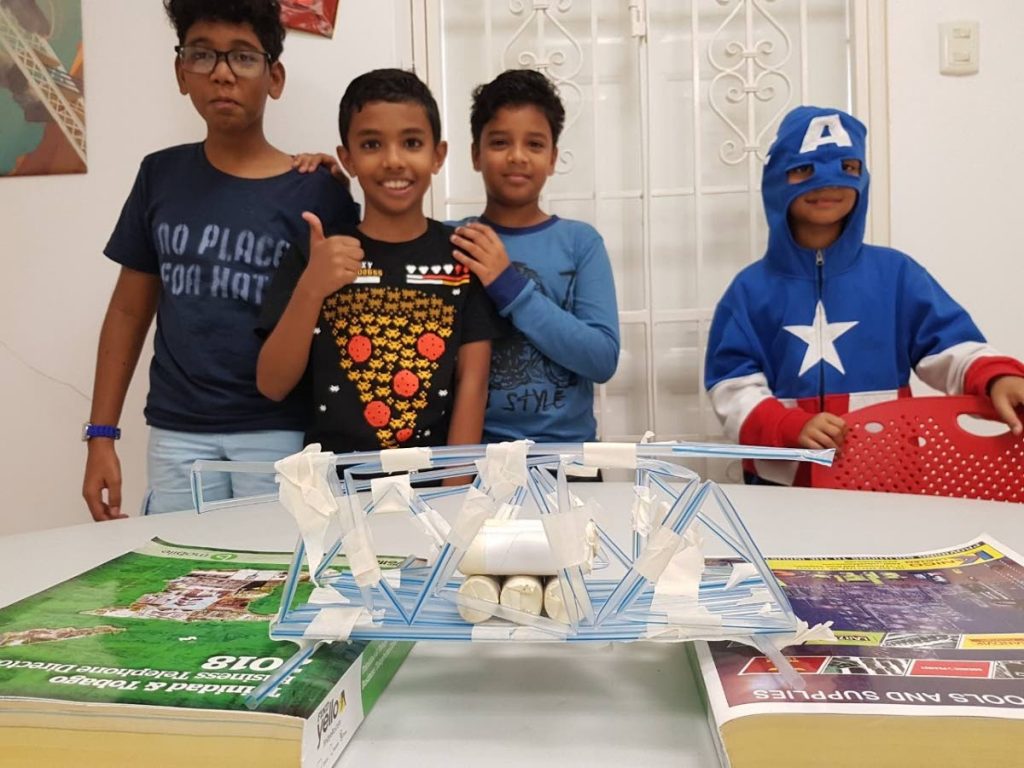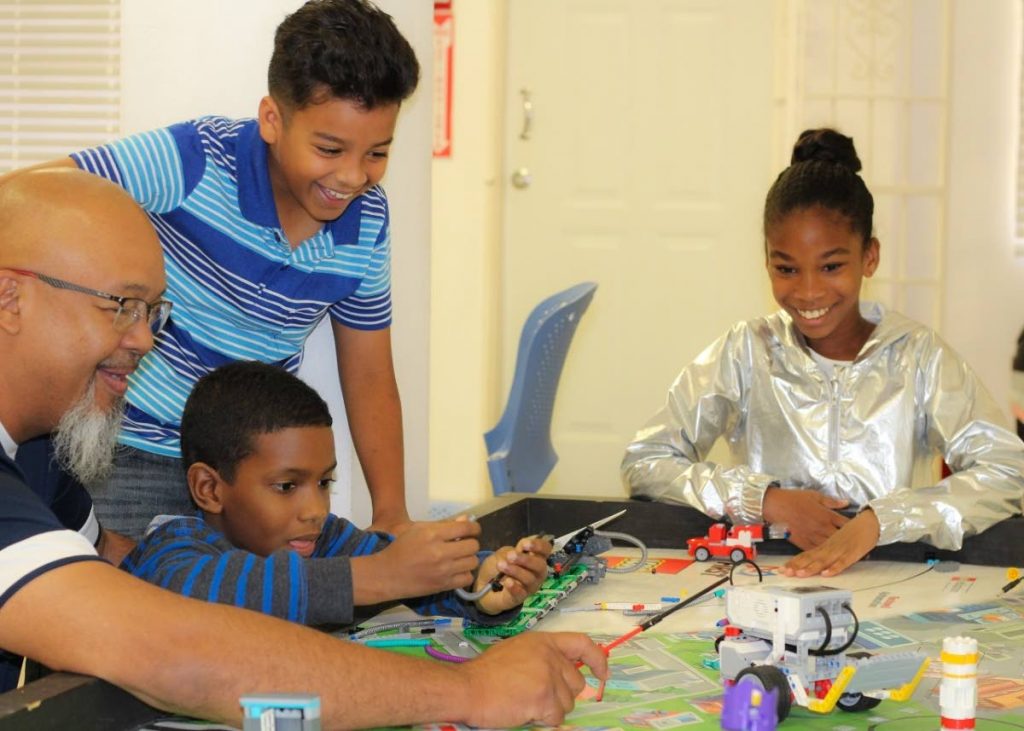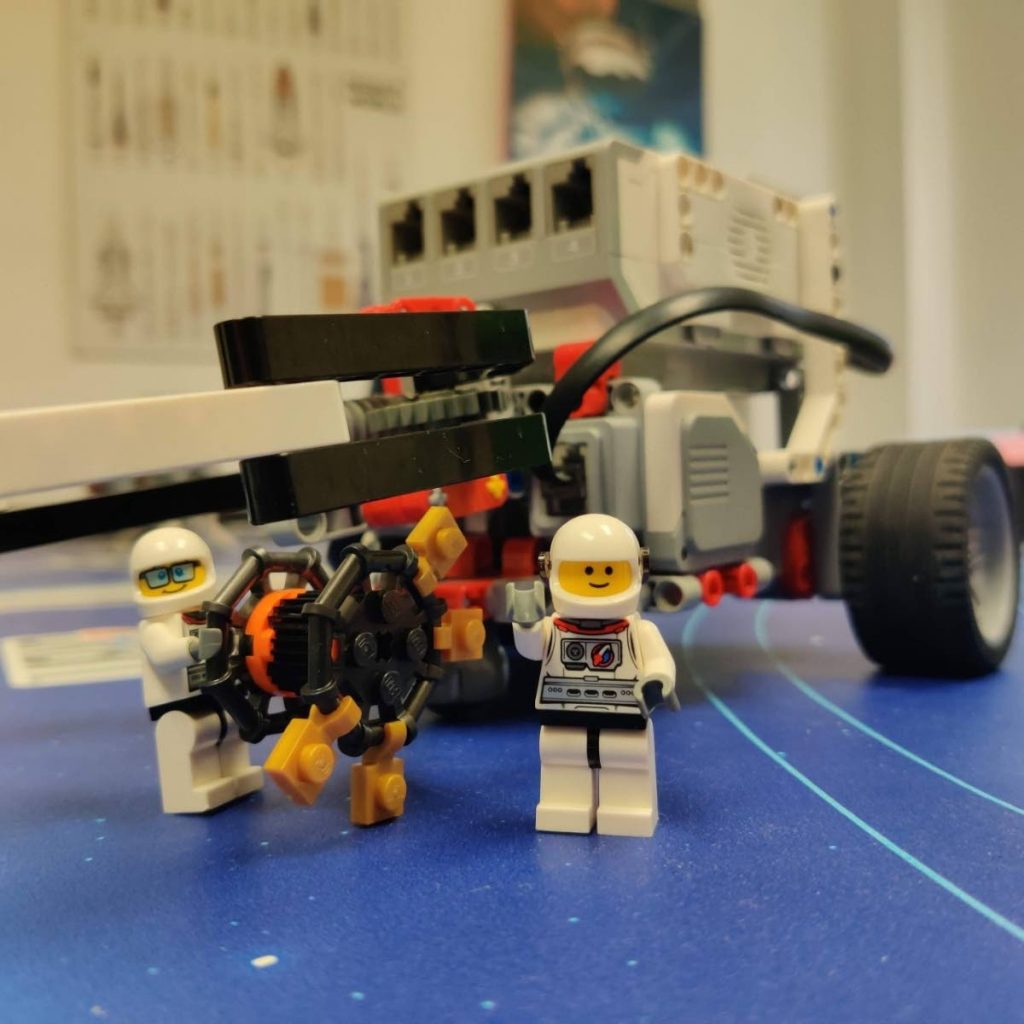WeInnovate, a robotics world for children

WEINNOVATE, a robotics camp, is trying to broaden the perspectives of children by giving them real-life training in robotic engineering and computer programming.
WeInnovate is the brainchild of Francis Chow and Akeem Philbert, both 35, who are friends who met at Queen’s Royal College.
Philbert is the founder and owner of WePala, a software development company based in TT but operates in the US. He reached out to Chow to create a programme that exposed children to technology and WeInnovate was formed.
“We wanted to get kids in tech at an early age. By involved in tech, we don’t mean playing on their iPad, but something meaningful. Do coding and engineering. If we exposed children to tech now, in a few years, we (the country) would be in such a good place,” Chow said.
WeInnovate started in 2016 and had children in their class who were eight and nine years old. Some of those children stayed with WeInnovate and are now 11 and 12.

“There is a membership section. They stay with us and we teach them more advanced techniques.”
Technology is a great equaliser, Chow said. A tech company, such as WePala in TT can work for clients globally developing software for both mobile and web services.
“Any kind of apps you would want to build on your phone, whether it is business or otherwise, we can build for you. We saw the opportunity in tech. If I build software, it could reach anywhere across the world. There are no boundaries. Just build it and we could use it. This is something we can leverage in TT.”
He said children are exposed to chemistry, physics, mathematics, but not necessarily computer programming or robotics.
“They don’t know what programming is. You hear about it when professionals come to school and somebody would talk to you about it, but you never get to try it. You never get that tactile hold of something, build it, solve a problem. We set out to find some way to give kids that experience in tech.”
The WeInnovate team did research on fun activities and came across the First Lego League, an international robotics competition hosted by For Inspiration and Recognition of Science and Technology (First), an international not-for-profit youth organisation dedicated to inspiring children in science, technology, engineering and mathematics (STEM) and Lego.

Every year the competition gives a range of challenges for children to solve using robotics.
“It is super exciting for the kids. They get to try their hand at engineering and problem-solving. This is real-world problem-solving.”
Last year the children worked on space exploration problems. This year the children were challenged to solve a traffic issue in the country.
They reasoned that maxi taxis cause traffic when trying to pick up a passenger at the side of the road causing a pileup.
The children decided to build an app, similar to rideshare app Uber, for maxi taxis. A person can order the maxi on the app and it would show up at the designated maxi stop.
However, the competition got cancelled because of covid19.
“Year after year we do well in the competition. We got invited to go Estonia for the robotics competition but that was so expensive. We tried all kinds of fundraisers, but you can’t make up that kind of money.”
Chow said robot programming is a lot of trial and error but the mistakes and failures would be part of the learning process.
Robotics as a teaching tool
While WeInnovate is not an academic programme, Chow said the students get a first hand experience on what the formula they are learning in school is used for.
“Why do you learn the circumference of a circle? You don’t learn that in practical life. The circumference of a circle is the distance the wheel will travel. In a practical sense, the kids understand that’s why I’m learning this. They learn the practical application.

“This is not groundbreaking. Physics does not live in a vacuum. Maths does not live by itself. Bridging these things together in practical use. You have engineering, you build the robot, this is the physics behind it. Computer science is where you build the programming. We are maths, physics, computer science programming in one, but not academic.”
One year WeInnovate had an after-school programme at St Joseph Boys’ RC.
One of the boys in the class did not do well in SEA and had to repeat. His teachers described him as difficult to teach, but with the WeInnovate team, he was able to solve the challenges faster than anyone else in class.
“Everyone was amazed by how he figured that out. This kid is very good at thinking outside the box.”
WeInnovate offered him a scholarship just so he could learn more and when he went into secondary school, he would take the contraptions he made at WeInnovate into class.
“He was taking apart old radios and toys and putting electronics together to make contraptions. People were wondering where he went to learn those things. We were so amazed, we gave him a scholarship.”
The boy was ten at the time. The school noticed how gifted he was and got him transferred to another school with a stronger science programme.
Failure leads to success
Testing, he said, is important, but how one is tested makes the difference. Failure is an important part of the learning process. Failure should not be treated as the end of the world.
“You give them a practical component and you go off and do it. There is a part where you do a full challenge. Take what you learnt and put it together. If you did not understand some core functions or did not have a core understanding of what you were doing before you would not understand how you are doing the challenge.”

By the students doing the challenge, failing and trying again, they learn more, Chow said.
“When you finally get it, they feel so good. It is not about getting everything right. Get it wrong sometimes. It’s okay and when you finally get it right, you’re going to love it and be so proud of yourself, trust me. It’s great to fail. When you fail you learn so much.”
WeInnovate was sponsored by Republic Bank to do a Christmas camp for children who could not afford classes. Digicel sponsored students from the Audrey Jeffers School for the Deaf in Marabella.
“That was very well received. They don’t do the full curriculum down there. When we came in and showed them (the deaf children) what programming was, they were blown away and thought they could do this for a living.”
The deaf students learned about robot turns, doing a hand grab – an attachment to the base robot to the environment.
“They were programming robots to do movements, to pick up a block or plastic bottle. Programming the robot to pick up the trash and put it in the bin. They learned the logical steps”
On Wednesdays, WeInnovate has a class for autistic and special needs students. Their ages range from 16 to 30. They build and programme robots.
“They’ve been with us since last year and are very capable. You would be surprised at the copious notes they take.”
Ninety per cent of WePala’s developers were male and Chow always wondered why.
“Tech is not something that should be male dominated. There is nothing that makes a man superior. No heavy lifting, that should stop women from being on par.”
Getting girls interested in tech
Yet, it was hard for them to get female developers.
“Not enough girls are interested in tech.”
He noticed in a class with male and female students, when a question was asked the boys would be quick to jump and answer the question. Usually the boys had the wrong answer, and the girls would stay quiet. When he asked the girls the question, they would have the correct answer.
“We thought it was a lack of confidence. The boys were over dominating. We thought let’s have an all-girls camp, let’s see if they are more comfortable. I don’t know if it was well-received, only two girls came out to the all-girls camp.
“We were heartbroken. We really wanted to see the girls come out and represent and we wanted to see the girls come out into the safe space.”
Chow did not know if the parents thought their daughters did not need to attend a tech camp.
“I have a daughter, for sure I would send my daughters to the tech camp.”
The two girls who did attend had a lot of fun, Chow said.
“They were great. One girl started form one and she was interested in programming. I could see her being a programmer if she focuses.”
Because of covid19 all WeInnovate classes are online. They have 30 students doing one class per week. They are taught programming and engineering skills using a virtual robotics school kit.The children log on, WeInnovate teachers teach the section and then they solve the puzzle.
Because everything is virtual the company, located in El Dorado, got customers from Fyzabad, Penal, Pt Fortin and Tobago.
“We reach customers there who can actually be in our class. We are appreciative of the reach we have been able to get because of it.”

Comments
"WeInnovate, a robotics world for children"